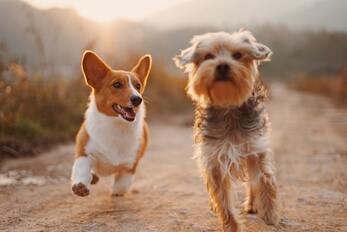Laurie Anne Walden, DVM  Socialization helps dogs become comfortable with new people, animals, and situations. It’s especially crucial for puppies and newly adopted dogs. Socializing dogs requires a little creativity during a pandemic, but you can still make sure they have the experiences they need to be well-adjusted pets. The best age to socialize puppies is up to about 3 months.[1] Very young pups consider everything they encounter to be a normal part of life, so they’re not likely to be afraid of these things later on. After 3 to 4 months of age, their brains are less receptive to new experiences and their fear responses increase. Puppies that don’t receive adequate early socialization sometimes grow into adult dogs with fearful, anxious, or aggressive behaviors that could land them in a shelter. Adult dogs also benefit from socialization and training. Newly adopted dogs need consistency and routine to help them settle into their new homes. Carefully exposing dogs to things that worry them, with plenty of positive reinforcement and professional help if necessary, can help them manage their fears. As always, contact your veterinarian if your dog is especially fearful or has had changes in behavior. Here are some things you can do to enrich your dog's environment during times of physical distancing. Indoor Exploration Give your dog toys that engage all of the senses: sight, smell, hearing, taste, and touch. Rotate the toys so your dog doesn’t get bored. Let your dog explore different areas of the house under supervision. Let young puppies interact safely with everyday objects, especially ones that move or make noise: brooms, umbrellas, pots and pans, blenders, vacuum cleaners, lawn mowers, bicycles, and so forth. Play music. Let your puppy play on different surfaces, like wood, carpet, pillows on the floor, slick surfaces, gravel, concrete, and grass. Wear hats, sunglasses, and your pandemic face covering—not necessarily all at the same time—in front of your puppy. Move the furniture around to help your pup get used to changes in the environment. Give dogs and puppies practice spending time alone to help prevent separation anxiety when you have to leave. Use positive reinforcement to teach your new dog or puppy that their crate is a safe space. Outdoor Exploration Sit outside with your dog or puppy and watch people go by. Is the neighbor using a leaf blower? Fabulous—this is a great opportunity to teach a young pup that loud sounds are OK. (If your dog is afraid of the sound, don’t push this! The point is to get puppies used to noises before they develop noise anxiety, not to force a fearful dog to sit through something scary.) Take your dog on walks. The more people, other dogs, and noisy vehicles a puppy encounters before 3 months of age, the better. Adult dogs also need the sensory stimulation they get from walks. Maintain physical distance from other people during the pandemic; the CDC recommends keeping dogs at least 6 feet away from people who aren’t in their own household.[2] Go for car rides, gradually increasing your dog’s time in the car. If your pet has motion sickness or car anxiety, contact your veterinarian. Body Handling Dogs that are used to being handled are less stressed than others at the veterinary clinic. Prepare your puppy for future veterinary visits by using positive reinforcement while touching his paws, ears, tail, and belly. On behalf of clinic staff everywhere, I beg you to get your puppy comfortable with foot handling while he’s young. Contact your veterinary clinic for advice if your dog has trouble with nail trims at home. More Tips Socializing Dogs During COVID-19 (American Veterinary Medical Association): https://www.avma.org/resources-tools/animal-health-and-welfare/covid-19/socializing-dogs-during-covid-19 Socializing Your Puppy During the COVID-19 Pandemic (University of Minnesota Veterinary Medical Center): https://www.vmc.umn.edu/sites/vmc.umn.edu/files/puppy_socializing_during_covid19.pdf References 1. American Veterinary Society of Animal Behavior. AVSAB position statement on puppy socialization. 2008. Accessed September 4, 2020. https://avsab.org/wp-content/uploads/2018/03/Puppy_Socialization_Position_Statement_Download_-_10-3-14.pdf 2. Coronavirus disease 2019 (COVID-19): if you have pets. Centers for Disease Control and Prevention. Updated June 28, 2020. Accessed September 4, 2020. https://www.cdc.gov/coronavirus/2019-ncov/daily-life-coping/pets.html Photo by Alvan Nee
0 Comments
Your comment will be posted after it is approved.
Leave a Reply. |
AuthorLaurie Anne Walden, DVM Categories
All
Archives
June 2024
The contents of this blog are for information only and should not substitute for advice from a veterinarian who has examined the animal. All blog content is copyrighted by Mallard Creek Animal Hospital and may not be copied, reproduced, transmitted, or distributed without permission.
|
- Home
- About
- Our Services
- Our Team
-
Client Education Center
- AKC: Spaying and Neutering your Puppy
- Animal Poison Control
- ASPCA Poisonous Plants
- AVMA: Spaying and Neutering your pet
- Biting Puppies
- Boarding Your Dog
- Caring for the Senior Cat
- Cats and Claws
- FDA warning - Bone treats
- Force Free Alliance of Charlotte Trainers
- Getting your Cat to the Vet - AAFP
- Holiday Hazards
- How To Feed Cats for Good Health
- How to Get the Most Out of your Annual Exam
- Indoor Cat Initiative - OSU
- Introducing Your Dog to Your Baby
- Moving Your Cat to a New Home
- Muzzle Training
- Osteoarthritis Checklist for Cats
- What To Do When You Find a Stray
- Our Online Store
- Dr. Walden's Blog
- Client Center
- Contact
- Cat Enrichment Month 2024
|
Office Hours
Monday through Friday 7:30 am to 6:00 pm
|
Mallard Creek Animal Hospital
2110 Ben Craig Dr. Suite 100
|
Site powered by Weebly. Managed by IDEXX Laboratories

 RSS Feed
RSS Feed